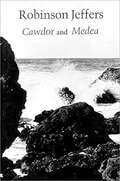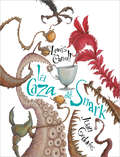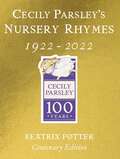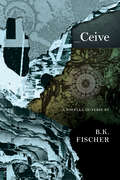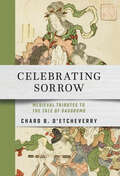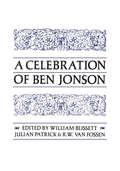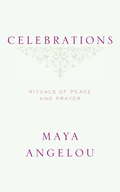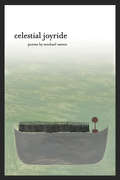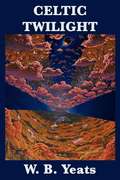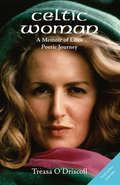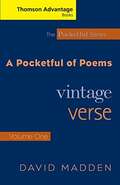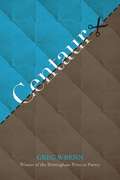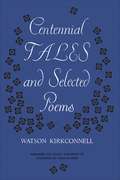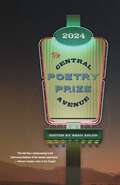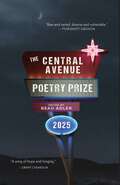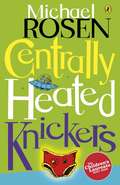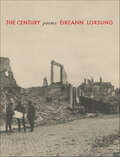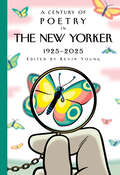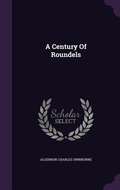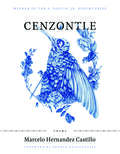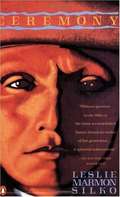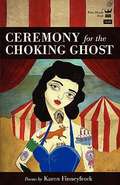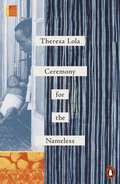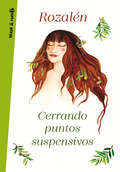- Table View
- List View
Cawdor, a Long Poem
by Robinson JeffersHere for a new generation of readers and students are two major poetic works of Robinson Jeffers (1887-1962). <P><P>The verse narrative Cawdor, set on the ruthless California coast which Jeffers knew so well, tells a simple tale: an aging widower, Cawdor, unwilling to relinquish his youth, knowingly marries a young girl who does not love him. She falls in love with his son, Hood, and the narrative unfolds in tragedy of immense proportions. <P><P>Medea is a verse adaptation of Euripides' drama and was created especially for the actress Judith Anderson. Their combined genius made the play one of the outstanding successes of the 1940s. In Medea, Jeffers relentlessly drove toward what Ralph Waldo Emerson had called "the proper tragic element"―terror.
La caza del Snark
by Juan Gedovius Lewis CarrollEl viaje imposible de una tripulación improbable para hallar a una criatura inconcebible Un poema de Lewis Carroll que cuenta, en ocho actos, las aventuras de una tripulación de marineros que se embarca en la búsqueda del peligrosísimo Snark.
Cecily Parsley's Nursery Rhymes (Beatrix Potter Originals)
by Beatrix PotterCelebrate 100 years of Cecily Parsley's Nursery Rhymes!Discover this timeless gold edition of Cecily Parsley's Nursery Rhymes on the 100th anniversary of its first publication. Full of delightful rhymes, such as Goosey Goosey Gander, This Little Piggy and Three Blind Mice, each one carefully reimagined in Potter's traditional style. Packed with Beatrix Potter's original watercolour illustrations and classic rhymes, Cecily Parsley's Nursery Rhymes has delighted young readers for generations. The ideal gift for fans of Peter Rabbit and Beatrix Potter. Other titles in this series include:Beatrix Potter: The Complete TalesThe World of Peter Rabbit: The Complete CollectionPeter Rabbit: The Complete Adventures
Ceive
by B.K. FischerA poetic retelling of Noah’s Ark set in the near future, Ceive is a novella in verse that recounts a post-apocalyptic journey aboard a container ship. This contemporary flood narrative unfolds through poems following the perspective of a woman named Val, who is found in the wreckage of her flooding home by a former UPS delivery man. As environmental and political catastrophes force them to flee the Eastern Seaboard, Val and her rescuer take refuge alongside a group of pilgrims seeking refuge from the catastrophic collapse of a civilization destroyed by gun violence, climate crisis, and social unrest. The ship of cargo and refugees is run by the captain Nolan and his wife Nadia, who set sail for Greenland, now warmed to a temperate climate. The couple place Val in charge of caring for a neurodivergent young boy who holds knowledge of analog navigation. Mourning her missing daughter, Val experiences both isolation and a wellspring of compassion in survival, an indefatigable need to connect. She and the other pilgrims weather illness and peril, boredom and conflict, deprivation and despair as they set sail across stormy, unfamiliar waters. Drawing from the Anglo-Saxon poem The Seafarer, the Bible, and the Latin root word in receive, Ceive is a vision of eco-cataclysm and survival—inviting meditations on biodiversity, illness, social law, sustenance, scripture, menopause, sensory perception, human bonds, caregiving, and loss, all the while extending a call for renewal and hope.
Celebrating Sorrow: Medieval Tributes to "The Tale of Sagoromo"
by Charo B. D’EtcheverryCelebrating Sorrow explores the medieval Japanese fascination with grief in tributes to The Tale of Sagoromo, the classic story of a young man whose unrequited love for his foster sister leads him into a succession of romantic tragedies as he rises to the imperial throne. Charo B. D'Etcheverry translates a selection of Sagoromo-themed works, highlighting the diversity of medieval Japanese creative practice and the persistent and varied influence of a beloved court tale. Medieval Japanese readers, fascinated by Sagoromo's sorrows and success, were inspired to retell his tale in stories, songs, poetry, and drama. By recontextualizing the tale's poems and writing new libretti, stories, and commentaries about the tale, these medieval aristocrats, warriors, and commoners expressed their competing concerns and ambitions during a chaotic period in Japanese history, as well as their shifting understandings of the tale itself. By translating these creative responses from an era of uncertainty and turmoil, Celebrating Sorrow shows the richness and enduring relevance of Japanese classical and medieval literature.
A Celebration of Ben Jonson
by William F. Blissett Julian Patrick R.W. Van FossenThe papers in this volume were given by some of the world's foremost Jonsonian scholars at a conference at the University of Toronto which marked the 400th anniversary of his birth. Each contributor came from a different institution, and Canada, the United States, Great Britain, and New Zealand were represented. The balance of papers likewise reflects the range of Ben Jonson's achievement and the combination of brio and control so characteristic of him.The papers arrange themselves in pairs: 'The Incredibility of Jonsonian Comedy,' as discussed by Professor Clifford Leech, is of a piece with distrust and defiance of the audience as discussed in the paper 'Jonson and the Loathèd Stage' by Professor Jonas Barish; Professor George Hibbard in 'Ben Jonson and Human Nature' and Professor D.I. McKenzie in 'The Staple of News and the Late Plays' offer critical assessment of plays, the one wide-ranging, the other closely focused on a previously neglected play; and Professor H.N. Maclean in '"A More Secret Cause": The Wit of Jonson's Poetry' and Professor L.C. Knights in 'Ben Jonson: Public Attitudes and Social Poetry' approach the difficult and rewarding task of defining Jonson's poetry of appraisal in different but complementary styles.
Celebrations: Rituals of Peace and Prayer
by Maya AngelouGrace, dignity, and eloquence have long been hallmarks of Maya Angelou’s poetry. Her measured verses have stirred our souls, energized our minds, and healed our hearts. Whether offering hope in the darkest of nights or expressing sincere joy at the extraordinariness of the everyday, Maya Angelou has served as our common voice. Celebrations is a collection of timely and timeless poems that are an integral part of the global fabric. Several works have become nearly as iconic as Angelou herself: the inspiring “On the Pulse of Morning,” read at President William Jefferson Clinton’s 1993 inauguration; the heartening “Amazing Peace,” presented at the 2005 lighting of the National Christmas Tree at the White House; “A Brave and Startling Truth,” which marked the fiftieth anniversary of the United Nations; and “Mother,” which beautifully honors the first woman in our lives. Angelou writes of celebrations public and private, a bar mitzvah wish to her nephew, a birthday greeting to Oprah Winfrey, and a memorial tribute to the late Luther Vandross and Barry White.More than a writer, Angelou is a chronicler of history, an advocate for peace, and a champion for the planet, as well as a patriot, a mentor, and a friend. To be shared and cherished, the wisdom and poetry of Maya Angelou proves there is always cause for celebration.
Celestial Joyride
by Michael WatersIn these poems of taut clarity, craft, and texture, Michael Waters continues his bold exploration of sensual pleasure and moral transgression as means of affirming spiritual faith. Just as a joyride suggests recklessness and exhilaration, so Celestial Joyride is an energized journey marked by spiritual recklessness in the face of perpetual mortality. Compelling, musical narratives offer rich meaning and vivid consequence.Michael Waters's poetry books include BOA Editions titles Gospel Night, Darling Vulgarity, finalist for the Los Angeles Times Book Prize; and Parthenopi, finalist for the Paterson Poetry Prize. He teaches at Monmouth University and in the Drew University MFA Program.
Celtic Twilight
by W. B. YeatsWilliam Butler Yeats was an Irish poet and dramatist and one of the foremost figures of 20th century literature, a pillar of both the Irish and British literary establishments. He was a driving force behind the Irish Literary Revival and, along with Lady Gregory and Edward Martyn, founded the Abbey Theatre, serving as its chief during its early years. In 1923 he was awarded the Nobel Prize in Literature for what the Nobel Committee described as "inspired poetry, which in a highly artistic form gives expression to the spirit of a whole nation."
Celtic Woman: A Memoir of Life's Poetic Journey
by Treasa O'DriscollCeltic Woman explores with open honesty and engaging irony how cycles of personal discovery have connected international performing artist Treasa O’Driscoll to heaven and earthbut not the way you’d expect. This surprising memoir of an Irish woman attuned to poetic updrafts and spiritual downloads in the lives of real people, many of them celebrities in Ireland and North America she counts as personal friends, exudes her Celtic heritage on every page. Her encounters in life have been testing, tragic, romantic, and highly comic. O’Driscoll’s life entwines with musicians, poets, teachers, artists, actors, farmers, unexpected strangers and familiar drunkards. Their lives all become a single interwoven tapestry of common meaning connected at the level of the soul.
Cengage Advantage Books: Vintage Verse, Volume I, Revised Edition
by David MaddenOne of David Madden's Pocketful series (including titles in fiction, poetry, drama, and the essay), this slim volume includes over 100 of the most familiar and most taught poems, arranged alphabetically. Priced to be affordably packaged with two or even three other volumes, each book in the Pocketful series can also be used separately.This text will range from classic, traditional poems mixed with contemporary poets.. This text is intended to be an inexpensive alternative to the more expensive anthologies.
Centaur
by Greg WrennGreg Wrenn's debut collection opens with a long poem in which a man undergoes surgery to become a centaur. Other poems speak in voices as varied as those of Robert Mapplethorpe, Hercules, and a Wise Man at the birth of Jesus. Centaurskitters along the blurred lines between compulsivity and following one's heart, stasis and self-realization, human and animal. Here, suffering and transcendence are restlessly conjoined.
Centennial Tales and Selected Poems (The Royal Society of Canada Special Publications)
by Watson KirkconnellAn all-inclusive edition of the poetry of Watson Kirkonnell would run to some ten large volumes of original verse and translations. His original verse would fill two volumes the size of this one, and his translated verse—from Icelandic, Italian, Dutch, French, Magyar, Latin, Ukrainian and Polish—would fill 5,000 pages. No poet in the English-speaking tradition is more deeply grounded in world literature. The original poetry of Watson Kirkconnell has been primarily narrative in character: first, the twelve philosophically slanted books of his Spenserian epic, The Eternal Quest; then the seventeen vivid narratives in The Flying Bull, and Other Tales, a sort of Western echo of The Canterbury Tales; and finally the thirty narrative poems of his new Centennial Tales, many of which were written in 1964. These are framed about the history of Canada, and are written in honour of the nation's Centennial in 1967. They range from the coming of the first "Amerindians" from Asia about 30,000 B.C. to a possible atomic holocaust in A.D. 2000, and include poems on the Quebec Conference of 1864, the Vimy Memorial, the Italian Campaign and the Canadians in Cyprus. This volume also contains some lyrics from Dr. Kirkconnell's light opera, The Mod at Grand Pré, and the whole of his Greek-style drama, Let My People Go, with its setting in Egypt just before the Exodus and its issues in the present. The original poetry has been arranged in roughly the reverse of chronological order, while the translations are arranged according to the dates of publication.
Central Avenue Poetry Prize 2024 (Central Avenue Poetry Prize #1)
by Beau AdlerImagine if you could have the best debut poetry from the widest variety of up-and-coming poets in one, single place. A compilation of fresh faces from all walks of life, The Central Avenue Poetry Prize assembles a swathe of standout poetry and delivers it straight to your bookshelf. A collaborative effort between poets from all corners of the world and all walks of life, The Central Avenue Poetry Prize presents a collection of poetry like no other. Rife with heartache, longing, laughter, and life, this book captures the spark of creativity and the vastness that is the human soul within its pages. This collection contains stories that are funny, some that are sad, some that are beautiful—and all that are true. Diverse in content and rich in talent, this is a testament to the art of poetry, and a reminder that the act of writing comes from the act of living, and when we create, we allow ourselves to see and be seen.
The Central Avenue Poetry Prize 2025 (Central Avenue Poetry Prize)
by Beau AdlerImagine having access to the finest debut poetry from a diverse array of emerging poets, all conveniently compiled in a single volume. The second instalment of The Central Avenue Poetry Prize maintains the exceptional standard set by its inaugural edition.This second volume of The Central Avenue Poetry Prize offers a collection of depth and breadth from poets worldwide and of various backgrounds. Readers will find a tapestry of emotions—heartache, longing, laughter, and the essence of life itself—each poem capturing human creativity and experience. From anecdotes to reflections, from tales of beauty to moments of raw truth, this collection serves as both a tribute to the art form and a poignant reminder that writing is an extension of living—an act of expression that allows us to reveal ourselves and connect with others.
Centrally Heated Knickers
by Michael RosenHail! Hail!I come from anothergalaxy.Discover the wierd and wonderful world of martians, woolly saucepans and centrally heated knickers in 100 poems about science and technology from the delightfully irreverent, Michael Rosen, Children's Laureate 2007 - 2009.
The Century: Poems
by Éireann LorsungA meticulously detailed catalogue of ordinary people performing acts of extraordinary violence, The Century charts an awakening to structures of dominance and violence. In the tradition of witness poetry, The Century tugs apart the quotidian horrors required to perpetuate acts of violence like the Holocaust, the deployment of nuclear weapons in Japan and Iraq, American slavery and its lingering aftermath. When Éireann Lorsung writes of death and dying, of “bodies in the fields becoming the fields,” it’s the simplicity that’s most haunting. After a fire, “some of their skin moved off of them as they ran, a very / simple melting…” But these poems don’t just witness; they also resist and serve as models for resistant lives. Pushing back against form and grammar, constructions of time and geography, Lorsung traces decades of technological, geopolitical, and cultural shifts through generations and across continents as networks of dominance continue to be stubbornly upheld. The Century is evasive but thorny, splintering in the mind. This collection is a reminder that the arrival of each new century, decade, or year brings with it an invitation to join ongoing movements of resistance, air pockets of hope in the waters that we all swim or drown in.
A Century of Poetry in The New Yorker: 1925-2025
by New Yorker Magazine IncEdited by the magazine&’s poetry editor, Kevin Young, a celebratory selection from one hundred years of influential, entertaining, and taste-making verse in The New YorkerSeamus Heaney, Dorothy Parker, Louise Bogan, Louise Glück, Randall Jarrell, Langston Hughes, Derek Walcott, Sylvia Plath, W. S. Merwin, Czesław Miłosz, Tracy K. Smith, Mark Strand, E. E. Cummings, Sharon Olds, Franz Wright, John Ashbery, Sandra Cisneros, Amanda Gorman, Maggie Smith, Kaveh Akbar: these stellar names make up just a fraction of the wonderfulness that is present in this essential anthology.The book is organized into sections honoring times of day (&“Morning Bell,&” &“Lunch Break,&” &“After-Work Drinks,&” &“Night Shift&”), allowing poets from different eras to talk back to one another in the same space, intertwined with chronological groupings from the decades as they march by: the frothy 1920s and 1930s (&“despite the depression,&” Young notes), the more serious &’40s and &’50s (introducing us to the early greats of our contemporary poetry, like Elizabeth Bishop, W. S. Merwin, and Adrienne Rich), the political &’60s and &’70s, the lyrical &’80s and &’90s, and then the 2000s&’ with their explosion of greater diversity in the magazine, greater depth and breadth. Inevitably, we see the high points when poems spoke directly into, about, or against the crises of their times—the war poetry of W. H. Auden and Karl Shapiro; the remarkable outpouring of verse after 9/11 (who can forget Adam Zagajewski&’s &“Try to Praise the Mutilated World&”?); and more recently, stunning poems in response to the cataclysmic events of COVID and the murder of George Floyd.The magazine&’s poetic influence resides not just in this historical and cultural relevance but in sheer human connection, exemplified by the passing verses that became what Young calls &“refrigerator poems&”: the ones you tear out and affix to the fridge to read again and again over months and years. Our love for that singular Billy Collins or Ada Limón poem—or lines by a new writer you&’ve never heard of but will hear much more from in the future—is what has made The New Yorker a great organ for poetry, a mouthpiece for our changing culture and way of life, even a mirror of our collective soul.
A Century of Roundels
by Algernon Charles SwinburneSongs light as these may sound, though deep and strong The heart spake through them, scarce should hope to please Ears tuned to strains of loftier thoughts than throng Songs light as these. <P> <P> Yet grace may set their sometime doubt at ease, Nor need their too rash reverence fear to wrong The shrine it serves at and the hope it sees. For childlike loves and laughters thence prolong Notes that bid enter, fearless as the breeze, Even to the shrine of holiest-hearted song, Songs light as these. (Typographical errors above are due to OCR software and don't occur in the book.)
Cenzontle (A. Poulin, Jr. New Poets of America #40)
by Marcelo Hernandez CastilloWinner of the 2019 GLCA New Writers AwardAn NPR Best Book of 2018
Ceremony for the Choking Ghost
by Karen FinneyfrockThis book is a collection of poems about grief and its effect on the body, memory and love inspired by the author's personal experiences.
Ceremony for the Nameless
by Theresa Lola'What a joy to see a new sun rising in the poetic sky!' Nikki Giovanni Exploring naming and its power, the remarkable second collection from the award-winning poet and former Young People’s Laureate for LondonIn Yoruba culture, newborn babies are welcomed into the world, and ushered into the social fabric, through naming ceremonies filled with songs of praise. The names bestowed are communicative both of where the baby has come from – the circumstances of its birth, the atmosphere in the home – and of where its future will take it. Both are forms of destiny.Far-reaching and musical, Theresa Lola’s second collection explores the act of naming and its role in shaping our identities, our aspirations, what we carry and how we belong. Lola conjures and questions the realities of her dual Nigerian-British identity; traces the lineages of names; asks why some deserve to be named while others are treated as though invisible; and explores the ways our journey through life might require us to cast off old expectations – both others’ and our own – just as at other times it can bring us back, strangely and unexpectedly, to where we first began.In lyrical, joyful and moving poems, Lola breaks down the complexities of the diasporic experience and the way it is woven through family life, history and memory. Ceremony for the Nameless is an exquisite collection from a thrilling contemporary voice, described as among “the ranks of an exciting new wave of young female bards who are widening the appeal of poetry for a new generation” (Sunday Times Style Magazine).
Cerrando puntos suspensivos
by RozalénCantautora de primera línea, talentosa y comprometida, Rozalén nos regala una libre y honesta recopilación de reflexiones acerca de los momentos y situaciones más emocionantes e importantes de los últimos años. Los puntos suspensivos son finales abiertos y este libro, este inventario de recuerdos, es el punto y seguido que todos necesitamos para seguir adelante. En estas páginas se grita, se piensa, se reflexiona y se cuentan los silencios que hay detrás de cada sentimiento, de cada experiencia que Rozalén ha vivido en estos últimos años. En prosa y sin prisa, María se quita el paraguas que todos llevamos de serie y, sin cinturón de seguridad, deja que las palabras resbalen por su muñeca para contar y vivir con quien quiera leerlo todo lo que le llueve dentro, para compartirlo con cada lector que tenga el valor de mojarse.
